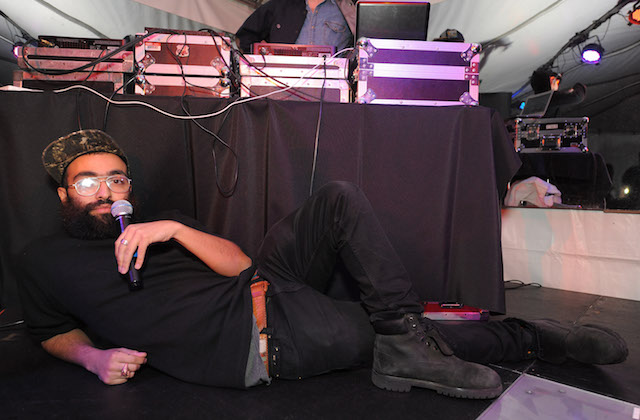Whatever you might think about Kool A.D.‘s music, one thing’s for sure: the dude is prolific.
The Bay Area-bred rapper and musician released six solo mixtapes and one album (the latter of which featured guest contributions from Talib Kweli and Digable Planets’ Ladybug Mecca, among others) in the nearly four-and-a-half years since he and his Das Racist bandmates disbanded. He did all of that on top of drumming with hardcore band Party Animal, protesting Israeli occupation of Palestinian lands, writing a novel, preparing a book of original visual art, having a child and writing a VICE column about parenting.
His latest release, the "Real Talk" EP, dropped last Friday (April 29). True to the social consciousness-infused irreverence that made him famous, this new EP addresses police brutality, Harriet Tubman and mass incarceration next to less serious topics. "Kill Dan Holtzclaw, kill Darren Wilson, kill Johannes Mehserle/peace to a-Maze, Frankie Beverly forever we stack notes like the Treasury, close all military prisons, free everybody," he blithely proclaims on EP’s title track, which samples Kanye West’s "Real Friends,"
We caught up with Kool A.D. via e-mail to talk about the new EP, Ye and racial equity. Check out his comically brief and occasionally poignant answers below.
Your music always told some amount of hard truths. Why did you title this latest EP "Real Talk"?
The phrase had been echoing in the domepiece recently, just kinda became an ad lib and then a track and then the title.
What’s your favorite track and lyric on the EP?
It’s a rich tapestry of lyrical threads mane, but if I had to distill the whole project into a single track and lyric, I’d have to say it’s the part on "Real Talk" where I say "real talk."
You sampled Kanye’s "Real Friends" really heavily on the title track. What do you think about all the controversy surrounding Ye and "The Life Of Pablo"?
I don’t understand why people find him so controversial. He seems like a regular dude.
Your music always centers discussions of race and social justice. What does racial equity look like to you?
I don’t know if my music centers on race and social justice so much as those topics remain within a stone’s throw of the conversation, more or less, at all times. I mean, all conversations are a stone’s throw away from another conversation just due to the inherent intersectionality of existence. But I mean, equity means equity: equal pay, equal opportunity for work and education, no more sanctioned murders of unarmed citizens by police, no more disproportionate state brutality and murder and imprisonment of Black and brown people, etc., etc.
Music and art that explicitly addresses social ills (particularly racism and police brutality) experienced a public visibility this year and last that it didn’t earlier—especially when you and your Das Racist bandmates were at the peak of your fame. Has the context in which you create music changed for you? If so, how do you respond to this kind of change?
I feel like a boiling point is inevitable when these ills are hundreds of years in the making in some way, shape or form. That context is always in flux, but my creative process is pretty much: turn off the intellect and let the spirit wander.
You’re extremely prolific. What’s next?
What can I say? The novel finally drops this year (I think) and I got an art book coming out sometime before that too. Been recording a lot of new stuff past week or so and still sitting on some old stuff, so yeah, more heat from your boy soon.
Click here to listen to and purchase the "Real Talk" EP.
